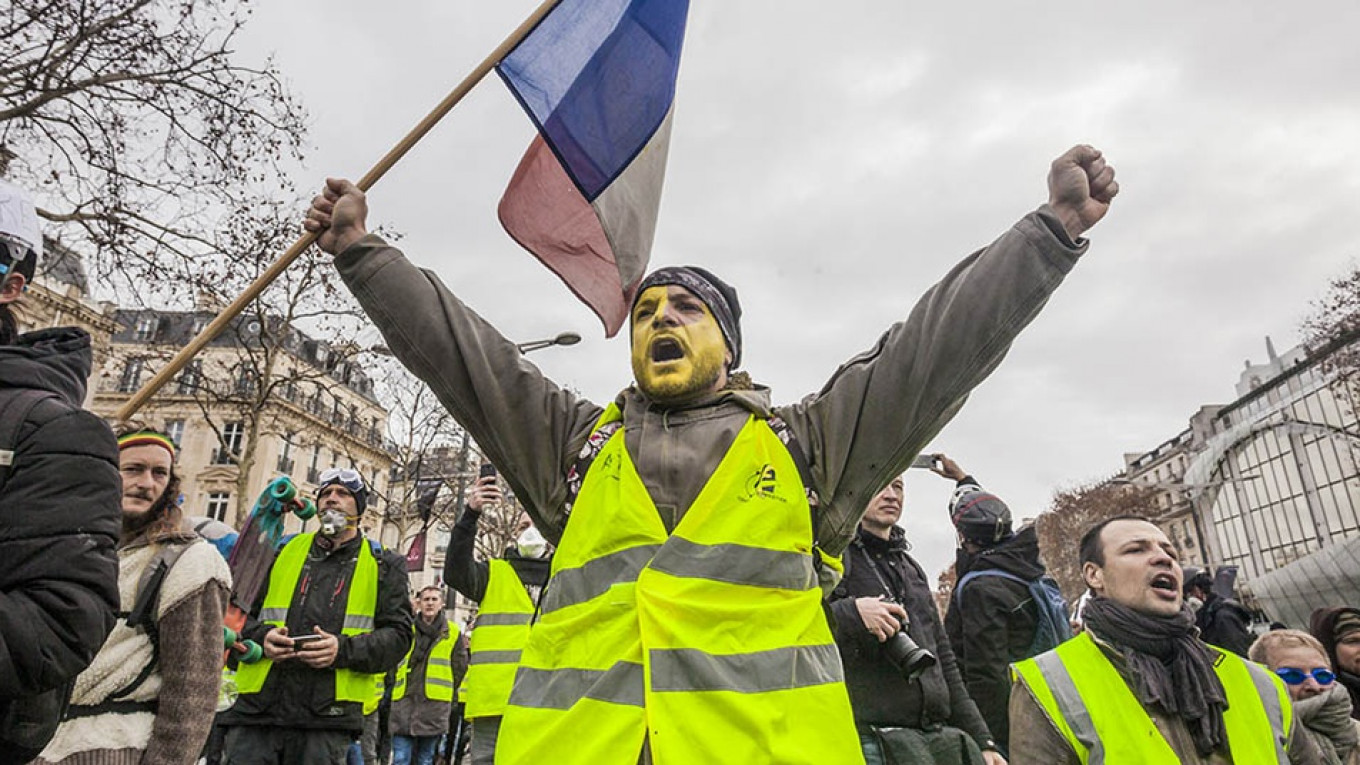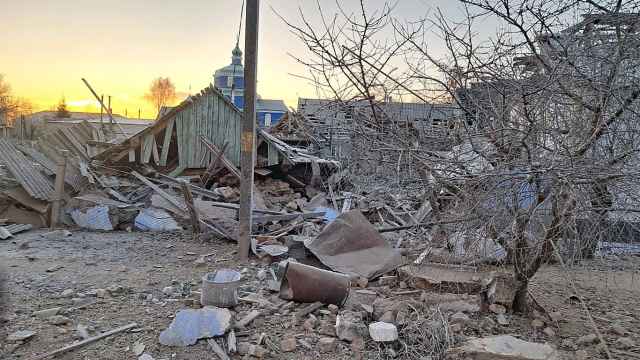The French security services are reportedly looking into the Russian boosting of the Yellow Vest cause. Even though it’s taking place quite openly, the investigators are on the same wild goose chase as Vladimir Putin’s regime following the Moscow protests of 2011- 2012 and the Ukrainian Revolution of Dignity two years later.
The Alliance for Securing Democracy, a U.S.-based think tank focused on foreign interference, doesn’t reveal which Twitter accounts it considers Russian mouthpieces and why. So some will be tempted to disregard its finding that in the past week, the gilets jaunes protests were the top theme for Russian propaganda on the the social platform, with #giletsjaunes the top hashtag. But there’s plenty of other evidence that the Russian propaganda machine is relishing the chaos in France.
“It looks like the agony of the Fifth Republic,” Dmitri Kiselyov, Putin’s chief domestic propagandist, commented breathlessly on last Sunday’s edition of his weekly analytical show, Vesti Nedeli.
The French arm of the Putin propaganda apparatus, RT France, which opened a year ago, has been all over the Yellow Vest story. In a recent Twitter thread, Margarita Simonyan, editor in chief of the RT network, cited a message she’d received from RT correspondent Charlotte Dubenskij, covering the protests in France: “It’s especially difficult for us in France, and I’ve run into people who have a bad attitude toward us many times. But in the last few weeks very many people have told us that they love RT and believe we show the point of view that other channels ignore. They say they follow the Yellow Vest protests and they are very happy with the way we cover them.”
Dubenskij could well be telling the truth. RT France, founded just a year ago, has more than 320,000 subscribers on YouTube, three times as many as RT U.K., which has been around longer, and half the number of subscribers of RT America. In France, the propaganda channel has been boosted by the authority of Frederic Taddei, a respected and popular TV anchor who joined RT in the fall to produce a talk show called Interdit d’Interdire (Forbidden to Forbid, one of the slogans of the May, 1968 rebellion in France). Taddei, known and often criticized for inviting controversial guests to his shows on French television, has argued that RT has given him the freedom to do whatever he wanted, something no French channel offered.
At the official level, Moscow, of course, denies having anything to do with the Yellow Vests: Putin’s press secretary Dmitri Peskov says the Kremlin respects French sovereignty and doesn’t meddle.
President Donald Trump showed no such respect last week when he tweeted the riots were a response to French President Emmanuel Macron’s policies on climate change and that the protesters were chanting “We want Trump!” But does that mean, as Kiselyov suggested on Russian state television, that the Yellow Vests’ angry actions “look like a ‘colored revolution,’ exported from America, after President Macron said Europe needed its own army”?
I seriously doubt it; maybe it’s time for democratic leaders and dictators alike to realize something important about the modern brand of protest, no matter where it takes place – in Cairo, Moscow, Kiev or Paris. If pro-establishment U.S. voices or Russian propaganda channels cheer it on, that doesn’t make it an import. It’s not a conspiracy instigated by foreign enemies even if, outwardly, it appears to serve the interests of Putin, Trump or George Soros.
As someone who has seen similar protests from the inside more than once, I say confidently that they are impossible to organize from the outside. Leaderless, diffuse, not focused on any specific list of demands, increasingly angry and violent while they still hold the participants’ attention, attracting and welcoming every species of dissatisfied individual, these protests are fostered by two factors: a very real sense of estrangement from a country’s elite and authorities, and social networks, which make spontaneous organization easy even in the absence of leaders and any other political infrastructure.
Such protests can spring up anywhere if these two factors exist. The U.S. is not immune to them and nor is Russia; China, however, is unlikely to see them because it controls the social networks – the 2014 Umbrella Protests in Hong Kong convinced the Chinese authorities they were on the right track there.
This doesn’t mean, of course, that foreign powers won’t try to take advantage of the protests. That’s what’s happening with the Russian propaganda and the Trump tweet. Putin’s Russia and Trump’s U.S. love the Yellow Vests because Macron has taken a stand against both Putin and Trump – and because both are objectively interested in a weaker European Union. There are plenty of protest-minded people in France who find it easy to be pro-Russian, and plenty to whom Trump’s nativism appeals.
But the core reasons for the protests are domestic, as Macron clearly realizes given his belated – and likely misguided – attempt to appease the protesters. Faced with a version of the Yellow Vests, any nation’s elite must look inward; the question to answer is, “What have we done wrong?” Once a satisfactory answer is found, there’ll be plenty of time to investigate foreign interference.
Leonid Bershidsky is a Bloomberg Opinion columnist covering European politics and business. He was the founding editor of the Russian business daily Vedomosti and founded the opinion website Slon.ru. The views expressed in opinion pieces do not necessarily reflect the editorial position of The Moscow Times.
A Message from The Moscow Times:
Dear readers,
We are facing unprecedented challenges. Russia's Prosecutor General's Office has designated The Moscow Times as an "undesirable" organization, criminalizing our work and putting our staff at risk of prosecution. This follows our earlier unjust labeling as a "foreign agent."
These actions are direct attempts to silence independent journalism in Russia. The authorities claim our work "discredits the decisions of the Russian leadership." We see things differently: we strive to provide accurate, unbiased reporting on Russia.
We, the journalists of The Moscow Times, refuse to be silenced. But to continue our work, we need your help.
Your support, no matter how small, makes a world of difference. If you can, please support us monthly starting from just $2. It's quick to set up, and every contribution makes a significant impact.
By supporting The Moscow Times, you're defending open, independent journalism in the face of repression. Thank you for standing with us.
Remind me later.








